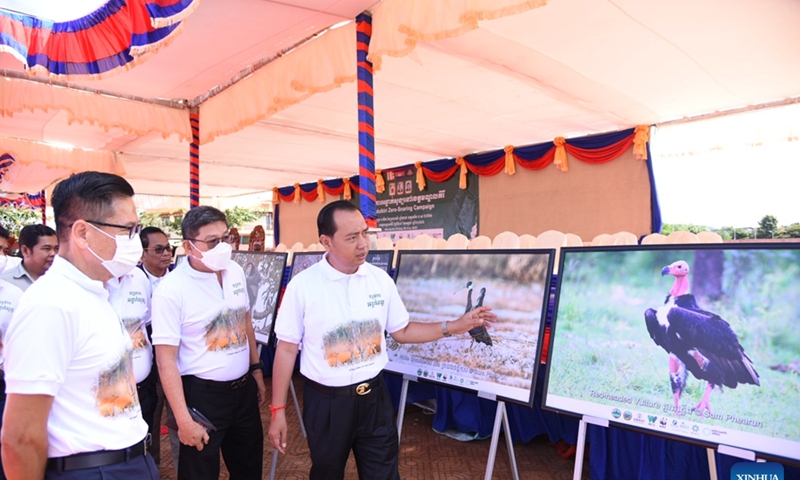Snares pose great menace to wildlife survival in Cambodia, say officials, conservationists

Neth Pheaktra (1st R), secretary of state and spokesman for Cambodia's Ministry of Environment, visits a wildlife exhibition during the Zero-Snaring Campaign event in Mondulkiri province, Cambodia on July 29, 2022. Officials and conservationists said here on Friday that snares have been posing a great menace to wildlife survival in Cambodia, urging greater participation from local people to eradicate snaring and poaching in protected areas.Photo: Xinhua
Officials and conservationists said on Friday that snares have been posing a great menace to wildlife survival in Cambodia, urging greater participation from local people to eradicate snaring and poaching in protected areas.
Ministry of Environment's secretary of state and spokesman Neth Pheaktra said the dire situation of biodiversity decline is not unique to Cambodia, but the global wildlife population, both terrestrial and aquatic, has fallen sharply by an average of 68 percent over the last 50 years.
"Illegal hunting from the past to the present, coupled with the large number of snares set in the natural forest, fueled by the illegal wildlife trade, constitute some of the main factors threatening Cambodia's wildlife," he said at the Zero-Snaring Campaign event.
"Snares are indiscriminate killers and pose a great menace to wildlife survival," he added.
Pheaktra said it's now the time for all to work together to take urgent and innovative conservation measures to help prevent these major threats, especially the snaring.
He added that as conservation has improved, habitats, water sources and forages have been protected, with some wildlife species increasing steadily, some remaining stable and some others dramatically declining, especially the ground-dwelling ungulate species.
"Effective law enforcement and economic development must go hand in hand in order to eradicate the snaring crisis," the spokesman said.
Seng Teak, World Wildlife Fund (WWF)-Cambodia country director, said concerted actions and strict law enforcement are urgently needed to stop the demand for bush meat and to shut down all forms of wildlife markets.
"One important way to tackle the root causes of wildlife hunting and trafficking is to ensure that people living in and outside protected areas are closely engaged in wildlife conservation, nature-based solutions and sustainable economic development," he said.
The Zero-Snaring Campaign, launched in March 2022 and slated to end in October 2022, covers Stung Treng, Preah Vihear, Kratie, Mondulkiri, Kampong Thom, and Ratanakiri provinces.
"One of the major threats facing wildlife populations in protected areas is indiscriminate hunting, primarily through the use of wire snares," said Nhem Sothun, Keo Seima Wildlife Sanctuary project manager for the Wildlife Conservation Society (WCS)-Cambodia.
According to the Ministry of Environment, some 61,611 snares had been removed from 72 protected areas and biodiversity corridors across the Southeast Asian country in 2021.
Bou Vorsak, chief executive officer of NatureLife Cambodia, said that from January to June 2022, at least 500 snares were confiscated and removed by rangers and communities from the Lomphat Wildlife Sanctuary, which straddles Mondulkiri and Ratanakiri provinces in the northeast.
"This demonstrates that snares are still the main threat to our wildlife," he said. "We strongly urge the relevant government authorities to crack down on the illegal wild meat trade in markets and restaurants. Together we protect our wildlife!" ■
